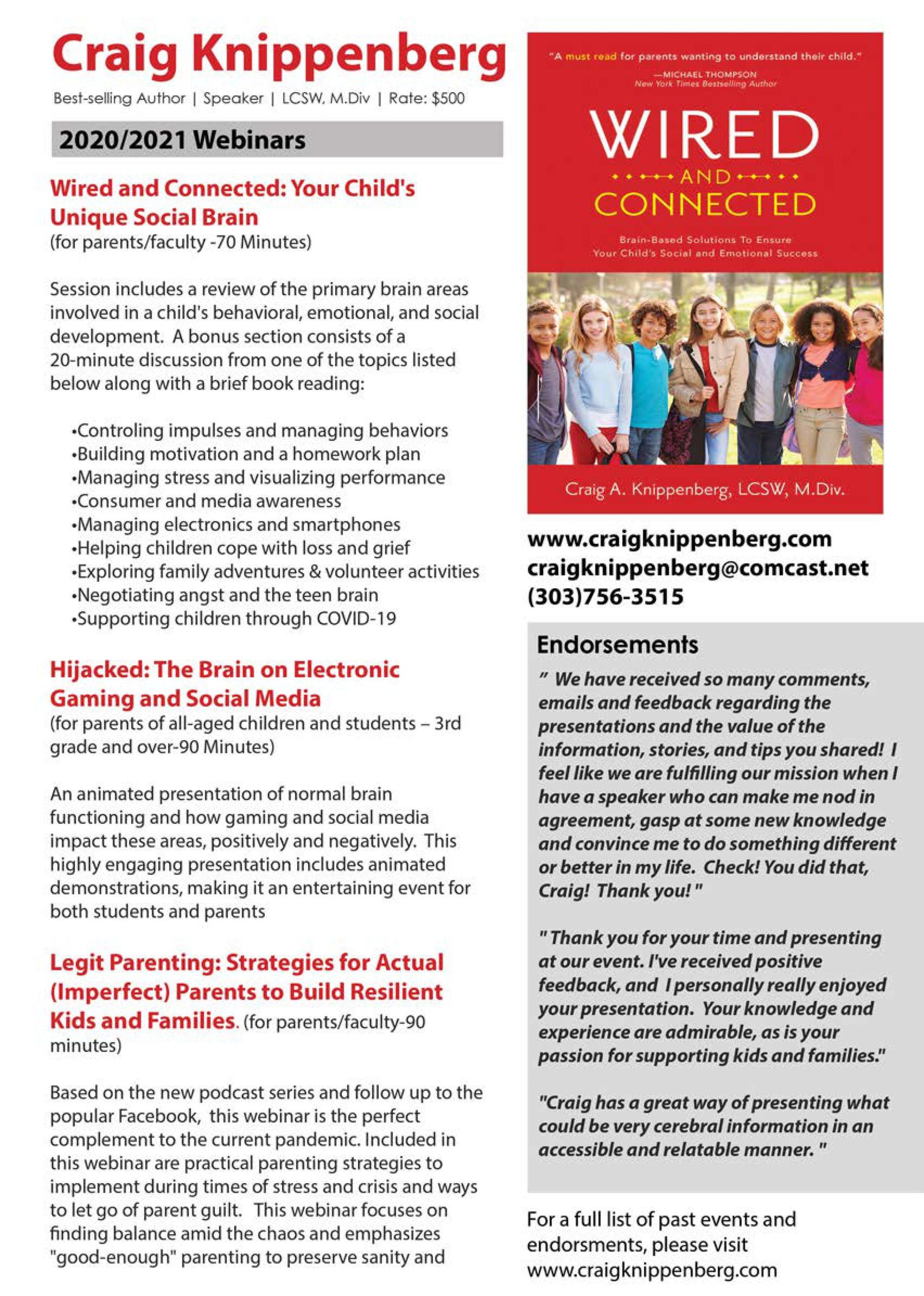Mental Health Resources
Mental Health Minute with DWS School Counselor Madhuri Deshmukh
Welcome to my mental health blog! As school counselor at The Denver Waldorf School, I’ll be posting resources for students and families as we continue to prioritize mental health as a community. If you are in need of my support services, please reach out via email, and bookmark this page for helpful tips and announcements.
December – More Than Just Worried
Anxiety and stress are normal. Life can be stressful; everyone feels stressed from time to time about so many things like performance at work/school, traumatic events, or changes in life. It is merely a response to different situations perceived as stressful or dangerous. Most children experience anxiety or worry in response to unfamiliar situations and everyday stressors. However, when we have too much stress, it can disrupt our daily lives.
Stress is commonly a reaction to an external cause, such as taking a quiz or having a conflict with a peer. Anxiety is internal, and usually a response to stress. Stress can go away when the situation is resolved whereas anxiety can be a persistent feeling of apprehension even if there is no immediate threat.
Both anxiety and stress affect body and mind, such as contributing to an increased heart rate, sweating, shakiness, headaches, butterflies in our stomach, etc., and urge us to decide quickly whether to fight, flee, or freeze from a threatening situation. Life is often fast-paced and requires a lot of our time and energy, and our children are no exception to that requirement. We all have varied definitions of what situations are threatening to us, and our perception is shaped by our experiences; what you might find threatening, another person may find easy to deal with. Just being aware of when our body is going into a fight, flight or freeze or fawn mode can be a considerable tool for enabling us to overcome our worry & anxiety. The fight response is when your body faces any perceived threat aggressively. Flight mode wants your body to run from danger. In a freeze mode, your body is unable to move or act against a threat. And in a fawn mode, your body tries to please someone to avoid conflict as a response to a threat.
What can caregivers do to help children struggling with anxiety?
• Talk to your child about how they are feeling. Acknowledge that their feelings are valid and that you are there to support them. Please keep an open conversation about how they are feeling.
• Establish a time of the day or week to discuss your child’s worries. When your child has worries, have them write/draw the worries down and put them in a jar. You can then go through them together during your chosen time or day.
• Manage your own anxieties/stressors. Various life circumstances can leave us all feeling anxious. Our children can easily pick up on this, so it is essential to keep your conversations age-appropriate and reassuring.
• Help your child start a gratitude journal. Gratitude is a great way to fight anxiety.
• Practice deep breathing together. Encourage your child to write or draw pictures about how they feel during this time.
• Find activities that help your child feel calm, like reading, drawing, exercising, or connecting with friends/family.
What can caregivers say to help children struggling with stress or anxiety?
When you are talking to a child feeling anxious, it can be hard to know what to say. Please remember it is important to validate their feelings and let children know you are there for support.
• Some positive things that you can say to your child when worry and anxiety creep in are “I hear you,” “I know this is hard for you,” “I am here for you,” “Let’s work through this together,” “What is your worry telling you?,” “How can I help you through this?,” and “You are safe. I am here.” These statements are simple and do not try to fix the problem for the child, but instead let them know that they are okay and supported.
• On the other hand, it is essential not to be dismissive of their worries. This can make a child feel irrational for sharing their feelings and be hesitant to share in the future. The common phrases that we want to avoid are “Stop worrying,” “Get over it,” ” I do not understand what you are worried about,” and “It is fine”. Please know that it is very difficult to decide to stop worrying. Unfortunately, worry does not have a controller we can switch on and off. Although these statements can have positive intentions, it may cause the child to feel like a letdown because they cannot simply stop.
• Again, the best thing to do is to validate their feelings, communicate about those feelings, and work together to help your child manage them.
When symptoms of your child’s or your own stress/ anxiety do not go away, it is important to recognize a need for more help and reach out to a professional. Please remember, if your child feels anxious or stressed, they are not alone. Because childhood anxiety is so prevalent, we all need to learn to best support our children when they are in stress or when their anxiety strikes.
World Kindness Day and DWS Kindness Week
World Kindness Day is an international holiday that is celebrated to promote kindness throughout the world and is observed annually on November 13 as a part of the World Kindness Movement. This year, DWS is planning to celebrate The Kindness Week from November 14th to November 18th. Details on themes and activities will be updated soon.
November – Small Group Counseling
Are you interested in having your child participate in a counseling group at school?
Small Group Counseling will be offered twice a year: once in the fall, and once in the spring. Group counseling involves a small group of students (usually 4-6 people) and a counselor. The group meets on a regular basis, during school, for a set amount of time (usually 30-45 minutes for 4-6 weeks) to talk about a common problem or situation. Specific meeting times are arranged with the classroom teacher (often during recess/lunch time). Everything shared in the group remains confidential and is not shared outside of the group. Group counseling gives students the opportunity to share problems and ideas, to help them feel that they are not alone in the situation, and to receive help with these issues from people their own age. It is also an opportunity for students to help others. Below are some of the groups I will be running during the school year. If you would like your child to participate in group counseling, please check the group or groups from which you feel your child could benefit, and sign up here.
- Friendship/getting along – friendship skills and how to resolve conflicts with friends
- Anger management – healthy ways to express and control anger that are not harmful to self or others
- Divorce/separation – helping students deal with family situations involving divorce or separation
- Grief/loss – death in the family, loss of a pet, relocation to a new area
- Self-esteem – encouraging better understanding of oneself, and recognizing positive aspects of oneself
- Study skills – forming good study habits, managing time, and being organized
- Inside out/ emotional regulation – helping students with identifying and understanding feelings and learning healthy calm down skills
- Positive leadership – focus would be on leadership skills and the promotion of resilience and positive self-esteem, while gaining a strong sense of belonging by connecting with peers
The first round of group counseling begins in the week of November 7th 2022 and ends in the week of January 16th 2023. If you would like more information on a particular group, scheduled meeting times, or have specific concerns to share, please contact me and I will be happy to talk with you.
September is Suicide Prevention Awareness Month
September is a National Suicide Awareness and Prevention Month (September 1 – September 30) that highlights open discussions on depression, mental health, and other social-emotional needs related to suicide and suicidal thoughts. Research states suicide is the second leading cause of death among school-age youth. However, suicide is preventable. People who are considering suicide often give warning signs of their distress. Parents/guardians, teachers, and friends are in a vital position to understand these signs and get them support. One of the essential key elements is not to dismiss warning signs or keep a secret regarding an individual’s safety. When we adults and students in the school community are committed to making suicide prevention a priority and are empowered to take the correct actions, we can help/support youth in crisis.
To support this cause at Denver Waldorf School, we request that our students, families, and staff wear suicide awareness colors (yellow, purple, turquoise) on September 28. I will also be training our high school students on suicide awareness & prevention that covers warning signs, resources for help/support, and coping skills on September 21. Please reach out with your concerns or questions regarding this training; happy to help with additional resources. Please know that it is an optional training for students; you can opt-out of your student if needed.
Helpful Resources:
- Crisis hotline numbers – Call 1-800-273-TALK (8255), Call/Text 988, Home – Safe2Tell
- National Parent Helpline 1-855- 4A PARENT (1-855-427-2736)
- Self-harm Hotline 1-800-366-8288
- LGBTQ Youth Crisis Hotline 1-866-488-7386 and Crisis Services for LGBTQ Young People – The Trevor Project
- Denver Public school district resources for students, families, and schools on crisis – Suicide Prevention Resources | Student Equity and Opportunity (dpsk12.org)
- Suicide Prevention 101 Webinar for Parents: Recognizing Signs and What to Do – This free webinar provides information about suicide prevention for parents, including warning signs for suicide, how to have a conversation with their teen, actions to take if their teen is having suicidal thoughts, and resources.
- For practical, actionable suicide prevention recommendations for parents/educators – Preventing Youth Suicide: Tips for Parents & Educators (nasponline.org)
- Save a Friend: Tips for Teens to Prevent Suicide (nasponline.org)
- Teen/family/educators resources to raise awareness, reduce stigma, educate students, promote good mental health, and encourage help-seeking – https://www.erikaslighthouse.org/
- The Trevor Project’s 2021 National Survey on LGBTQ Youth Mental Health
- Mental health support for minority students – 15 Resources to Support Minority Students All Year Long (schoolinks.com)
August – Resources for Reducing Back-to-School Anxiety
The beginning of the year after a long summer can be very overwhelming, especially when things start getting back to normal after a pandemic. We get used to not following usual routines during summer and it can be hard to adjust our lives back to the school routine. This shift can create stress and anxiety for anyone. It is not uncommon for children to create scary scenarios about school and be anxious about it. Listen to them, validate those feelings. You might try asking “what..If” questions/statements! For example, if children say, ‘what if my friends do not talk to me?”, “what if my teachers do not like me?”, “what if the school gets too hard”, reply by saying “what..If”. We sometimes unknowingly dismiss children’s feelings by saying ‘everything is going to be okay’. Explore these questions, these feelings, and validate them. Let children feel heard. Once you do that, go to “now..What” statements/questions from “what..If”. Example, ‘okay, what if that subject is hard, now what?’ This way you will encourage children to be problem solvers with your support and help.
There are a few more resources I thought might be helpful to ease your child’s back –to-school stress:
- For kindergarten and young children: https://www.edutopia.org/
article/4-steps-to-easing- kindergarten-jitters-michele- borba - Understanding and coping with back to school anxiety for all grade level children: https://www.pbs.org/parents/
thrive/how-to-cope-with-back- to-school-anxiety - More positive ways to know about your child’s day at school: https://www.edutopia.org/blog/
parents-fifteen-questions- replace-how-was-school-today- elena-aguilar
I look forward to building a positive relationship with each of you and looking forward to a wonderful academic year!
Mental Health Resources
Jenny’s Corner with DWS School Counselor
Thanks for visiting my mental health blog! My name is Jenny Thompson (MA, LPC), and I am the School Counselor at The Denver Waldorf School. I am glad you’re here! If you are in need of my support services, please reach out via email, and bookmark this page for helpful tips and announcements.
May is Mental Health Month
- Starting to Think About Mental Health
- What Plays a Role in Developing Mental Health
- Maintaining Good Mental Health
- Recognizing When You Need Hep with Your Mental Health
Movement and Mental Health
Here we are again, or should I say still? As we are continuing to navigate the effects of the pandemic, may we keep in mind our mental health is still an important aspect of our overall health. The American Academy of Pediatrics declared a national emergency in child and adolescent mental health as of October 2021. One way we can work to keep our mental health healthy is by making sure we are getting some exercise. Here are six ways in which exercise can help work to enhance our mental wellness:
-
Reduces stress and increases relaxation. Getting outside is not too hard to enjoy in beautiful Colorado and it also does wonders for relieving stress. Encourage your teen to join on a family walk or have your loved one take over the chore of walking the dog!
-
Alleviates anxiety and depression. When we get our heart rate up, our body starts to release endorphins (natural chemicals in our body which enhance feelings of happiness). It has been shown that even 30 minutes of exercise a few times a week can improve overall mood. Those with an anxiety disorder can actually reduce symptoms with exercise.
-
Improves self-confidence. Feeling strong and physically fit can do wonderful things for our self-esteem. Exercising, regardless of size or weight, can increase one’s view of their self-worth. Working out outside the home can also increase chances of meeting new people with similar interests.
-
Sharpens memory and prevents cognitive decline. Exercising can improve memory and learning. Researchers have linked children’s brain development with level of physical fitness. As we get older, as we all know, it’s harder to process and maintain information. Regular exercise at a younger age helps minimize that decline.
-
Helps control addiction. Exercise can help in addiction recovery. Exercise can effectively distract drug or alcohol addicts, de-prioritizing cravings. Exercise also helps reboot the body after going through negative effects from alcohol or drug abuse.
-
Creates higher levels of energy and productivity. Health benefits of exercise in teens can also boost creativity. Exercising outdoors or interacting with nature during exercise can create inspiration and creative thinking. When you need to get things done, get up and move!
Tips for Tackling Summer Depression
Did you know summer depression is a thing? The sunniest of seasons can bring on feelings of disorientation, lack of feeling grounded, and even depression. A recent article I read listed the following tips for adults and children, alike:
-
Acknowledge that summer sadness is a thing. Let’s face it, summer puts a lot of pressure on us to have fun and enjoy the sunshine! It may be hard to acknowledge that summer is not your favorite season. Becoming aware you can start taking steps to care for yourself in a different way and not beat yourself up for not LOVING summer.
-
Drop the image of what summer is supposed to look like. There can be a lot of pressure to emulate what summer used to look like. Allow yourself to be present and accepting of what summer actually feels like for you and try to not make it something that is not attainable! Also, be careful with social media people only show their best selves and it can lead us to compare ourselves with a snapshot of someone else’s life.
-
Be proactive about keeping to your own expectations. If depression or sadness affects you during summer then motivation to do the things you love is in jeopardy. Try to remember that after you do an activity or spend time with a friend, you rarely if ever, regret it. Try to keep to your plans, it’s good for your mental health.
-
Stay cool. Heat stress is a thing and it can cause us to have low distress tolerance and become easily agitated. Make sure you are noticing if you are getting too hot and if it has lasting effects on your mental health.
-
Try not to isolate yourself. It can be really difficult to put yourself out there for social connection but rarely if ever do we regret it. Going for a walk with a friend, attending that 4th of July party, or going to a movie with a bunch of friends, all things that we usually feel good afterwards. If you notice yourself starting to say a lot more no’s instead of yes’s then switch it up. Remember the last time you spent time with a friend and how it made you feel.
-
Know when to get help. Depression is depression regardless of the season. A good rule of thumb is if you know that getting out, seeing friends, and overall being active is good for you but you can’t seem to find the motivation to make it happen, it may be a good time to seek some professional help. My blog has a list of resources and I am always open to a phone call (even during the summer).
May is Mental Health Month
I love that there is a month where we dedicate time to check in with ourselves, our loved ones and our whole community. I’m excited to announce that our high school is doing just that. With the lead of two of our high schoolers we have started a group called Waldorf Minds Matter. This group comes together every other week to discuss mental health by using psychoeducation, support, and a safe place to share. I also enjoy working with the middle and lower school by individually checking in and working with groups.
Each week, for the month of May, I will be posting to this blog one topic you can consider in your own and your loved ones mental wellbeing.
Week 1: Radical Acceptance
Week 2: Stress and Trauma
Week 3: Anger and Frustration
Week 4: Cognitive Distortion
Week 5: Adaptability
Suicide Awareness and Prevention Resources
Click the button below to download local resources for Coloradans.
Drug and Alcohol Parent Education Evening with Colt Smith
I was joined by award-winning speaker Colt Smith for an invaluable presentation on the effects of drugs and alcohol on students. Watch the recording to hear his powerful story and garner insights and tips for parents and students, alike. Colt was also tremendously well received by our high school students during an in-school presentation as a recovering addict who brings compassion, empathy, and a breadth of knowledge. Learn more about him on his website Colt’s Drug Talks.

Resources
- Enthusiastic Sobriety—Support group
- Natural Highs—Amazing social group that provides peer mentoring, sober events, and reiki classes, and also teaches kids how to give the brain chemistry talks
- Fire Mountain—Stellar residential treatment center in Estes Park for teens
- Sandstone Care—Residential and outpatient treatment for teens and young adults. If a family member is wondering what to do, call Sandstone. Its admissions and outreach team does a GREAT job of referring out and finding what fits best for your teen
- iTHRIVE—Early intervention for teens that are just beginning a relationship with substances; a great resource that requires parent participation
- S.AF.E.—Sober AF Entertainment is a social group that has lots of sober events, concerts, sports, etc.
- Nicholas Thompson—Private practice therapist who rocks, and also has a podcast called Perspective 4 Parents that’s worth a listen
Random Acts of Kindness Week
During Random Acts of Kindness Week (February 14-20), I encourage all of us to consider what we can do to bring kindness to one another. One idea is to write a positive quality about each of your family members and share this with each other, maybe at dinner time. Another idea is to send someone you care about a card of appreciation (for adults and children, alike). Together, go through your children’s toys/clothes/books that are no longer being used and donate to an organization of your child’s choosing. The list goes on!
The takeaway: Kind acts not only help others they actually boost our and our child’s self esteem and introduce how purposeful we can be at at any age.
Podcast: Happiness Lab
Self compassion. If there were ever time we (adults and children, alike) needed to practice this, it is now. Kristin Neff joins Dr. Laurie Santos on the Happiness Lab, and goes through why it is so important to be compassionate with ourselves and to “dump our inner drill sergeant.” Neff describes self compassion as extending compassion to one’s self in instances of perceived inadequacy, failure, or general suffering. It’s worth a listen.
Mental Health Tips
The first DWS Parent Council meeting of the year included a presentation titled Minding Mental Health through Covid-19. Watch the recording and read the tips I covered below.
Tips for Parents
Here are some things we can do to help take care of ourselves
- Prioritize rest. Whatever that looks like for you (yin yoga, napping, sitting on the couch with our eyes closed, etc.).
- Again, realize the goal is to accomplish something not to be perfect.
- Give yourselves a break from all media. Give it up for 3 days or even 1 day and see if there is a difference in how you feel.
- Work on being gentle with yourself, try letting go or giving the self critic a day off. This also has an effect on how gentle we are with those around us.
- Pay attention to pacing. Everyone absorbs information and change at a different pace. Recognizing this can give us patience and challenge our expectations of others.
Tips for Students
Here are some mental health tips on what we as parents can do to help our children persevere through this ongoing time of pandemic and political unrest.
- Give your children hope. This to shall pass, there will be a vaccine and school will be back in full swing and some sort of normalcy will happen sometime in 2021. In turn, validate how they are feeling now and move onto a hopeful stance.
- Remind kids that we are being called on to be patient.
- Try to live in the present. This can be especially hard with anxious children but try to focus on today and if they start to veer off into the distant future, do your best to let them know that today is what we need to focus on and again to instill a more hopeful outlook. You can also start a gratitude practice with your children, maybe before you eat dinner or breakfast have everyone share something they are thankful for.
- Create a floating plan of the future. Ask what your child is looking forward to in the future and put them on a to-do board.
- Pay attention to and create small joys and activities for your child. Maybe baking once a week a sugary treat or bread, or facetime with a friend or relative
- Remind your child of how resilient they are. Point out to them that even though it hasn’t been easy they have survived some pretty big shifts in what is normal at home, school, with friends and neighbors. Remind them that they have proven they can do hard things
- Be aware of comparing your child to other children – everybody copes differently, we can help our children learn how to cope with their own unique perspectives and responses to stressful situations.
- Meditate with your child. Meditation, especially with anxious children can start pathways in the brain to not get caught up in every single thought we have (we have around 60,000 per day!). Meditation can help you and your child with accepting their emotions and can help with patience, which is greatly called upon now.
Mental Health Resources
Therapy Resources
I recommend the following therapists:
- By Light Counseling—Natalia Samman, LCSW; (720) 295-2553
- Blue Spruce Psychology LLC—Courtney Gallagher, PsyD; (720) 336-1477
- Center for Child and Family Psychology—(303) 871-3306; Sliding scale
- Amy Pickett-Williams—(303) 912-9806
Robbie’s Hope
Robbie’s Hope is geared toward helping teens with mental wellbeing, offering a vast number of resources, ideas and groups surrounding mental health. Please take some time to look over the website and share with anyone you think would be interested.
Coping with Seasonal Affective Disorder (SAD)
I wanted to remind our community that Seasonal Affective Disorder (SAD) may be intensified this year because of the pandemic and our political climate. SAD is a type of depression linked to the seasons and a reduction in the amount of light one receives throughout the day. It starts in the Fall and wanes in Spring. It zaps our energy and makes us feel more moody. SAD can affect any age group but most frequently starts between 18-30 years of age. Linked here and here are two articles, with the first geared towards adults and the second for the younger population.
Upcoming Events
In Response to the Boulder Tragedy
With the recent atrocities in our nation, I want to provide resources for assistance in talking with your loved ones about how to process and handle tragedy. I encourage all of you to be gentle with yourselves and allow space for different styles of processing when tragedy occurs. Also, make extra effort to check in with the children and teens in your life. Much love to you all!
For more on the many facets of mental health, please visit my blog Jenny’s Corner. or catch our webinar led by Charlie Orphanides on the benefits of movement in educating the whole child.
Talking To Kids About The Paris Attacks—By What’s Your Grief
Starting with the awareness of our own response, this listicle gives us 12 ways in which we can actively offer children and adolescents support.
Resource List—By the National Child Traumatic Stress Network
A list of links to specific articles within the NCTSN website that help adults understand the effects different kinds of events can have on children and adolescents of various ages, and what to do to reduce trauma and promote resilience. Some articles are available in Spanish.
Explaining the News to Our Kids—By Common Sense Media
A 30 second video accompanies this article talking about the potential trauma of constant media exposure, especially when tragedy occurs. Addressed are appropriate responses according to age group, roughly matching the first three planes of development.
How to Talk to Kids and Teens About World Trauma—By Karen Young of Hey Sigmund
10 general tips for having conversations that will help children manage and accept catastrophic events and find hope again followed by specific advice for each age group, roughly following the planes of development.
Talking About Tragedy—By Jack M. Jose for Angels and Superheroes
Jack M. Jose, principal of Gamble Montessori, gives teachers 4 questions to guide student discussion, and quite a lot of insight. Although aimed primarily at Secondary teachers, this article is also useful for parents and teachers of younger students.
Kids and Disasters: How to help them recover—By Betty Lai for The Conversation
A look at the short and long term effects of trauma caused by the experience of a disaster and ongoing trauma, such as war, on children, and how to support the development of resilience.
Talking to Children About Violence: Tips for Parents and Teachers—By the National Association of School Psychologists
7 tips to support children, and a list of talking points to keep in mind and emphasize in conversation that will reassure while maintaining a realistic outlook.
Waldorf Group Meditation Practice
Please enjoy the recordings of our monthly Group Meditation Practice led by Dr. Adam Blanning of the Denver Center For Anthroposophic Therapies.
For full details and dates, please visit the Group Meditation Practice event page.
Group Meditation Practice on January 6, 2021

Group Meditation Practice on February 3, 2021

Group Meditation Practice on March 3, 2021

Group Meditation Practice on April 7, 2021

Group Meditation Practice on May 12, 2021

Group Meditation Practice on June 9, 2021





